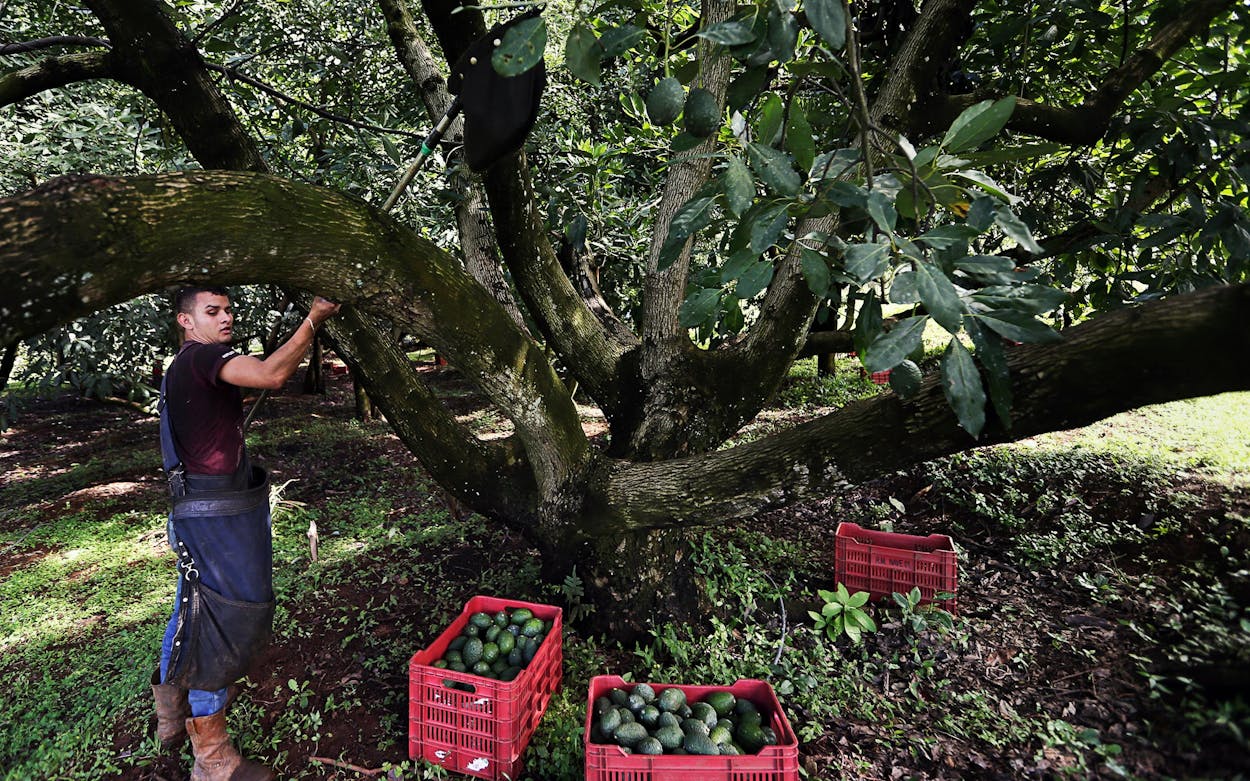When media outlets began to publish reports early Sunday that the U.S. had placed an embargo on Mexico-grown avocados, it seemed every American—not just those making guacamole for Sunday’s Super Bowl parties—had cause for alarm.
The prohibition on harvesting, packing, and shipping the fruit came after a U.S. Department of Agriculture plant inspector in Michoacán received a death threat via his cellphone. Yes, it’s a serious matter when U.S. government officials are targeted. However, the embargo allows the U.S. and Mexican governments time to investigate. The hold on importation has also led to fearmongering that Michoacán—the only Mexican state approved to export avocados—is a war zone. While cartels are vying for dominance in the state, Michoacán is not some devastated battlefield.
I’ve been to Michoacán (most recently in November 2019), including the city of Uruapan, the location of the plant where the inspector was threatened. I’ve roamed its mountain village streets during the day and at night. I’ve traveled its roads after dark. I’ve ambled through the avocado groves. I’ve marveled at the variety of the avocados, at least one of which can be eaten with the skin on. My experience is anecdotal, but I offer it as a counterpoint to the dominant media narrative. I’m not worried about Michoacán—the source of 80 percent of avocados consumed in the U.S.—and I’m not worried about the avocado embargo. Neither are the Texas distributors, markets, and restaurant owners I spoke with.
Rolando Curiel, owner of El Ultimo Taco in Brownsville, who has already had to navigate increasing prices, calls this latest obstacle “super crazy.” El Ultimo’s signature taco is the taco estilo Matamoros, which requires a creamy avocado wedge. He purchased four pallets of avocados—a total of 324 cases—on February 14. He expects that inventory to last three weeks. Once the stock runs low, he’ll begin to search for more supply. He’s already being courted by a distributor offering vacuum-sealed skinless avocados.
“Even if it’s terrible for business, when they’re gone, they’re gone,” Curiel says.
Andrew Savoie, chef and co-owner of Resident Taqueria in Dallas (famous for its guacamole studded with peas) explains that if he can no longer acquire avocados from his purveyor, the Texas-based Chefs’ Produce, he’ll remove guacamole from the menu. “I’m not really concerned right now,” Savoie adds. “We have other avenues for avocados. California grows avocados.”
Indeed, a recent report noted the Golden State produced 188,000 tons of avocados in 2020. California accounts for approximately 90 percent of domestic avocado farming and 15 percent of avocados eaten by Americans. While Mexico’s avocado season is year-round, the California avocado season begins in the spring and lasts through summer. And California avocados aren’t as creamy and sweet as Mexican Hass avocados, says Anastacia Quiñones-Pittman, executive chef of José in Dallas and another Chefs’ Produce client. But, she goes on to note, “if we have to move to California avocados, that’s what we’ll do.” Quiñones-Pittman has already had to raise prices on her avocado dishes due to inflation. “Our guacamole has two and a half avocados in it,” she says. “It’s not cheap to make guacamole.”
H-E-B isn’t worried about an avocado shortage, according to a story published by MySA.com. The San Antonio–based supermarket chain will rely on growers in California, Florida, and South America. However, avocado prices are expected to increase for restaurants and their customers.
Chefs’ Produce vice president Richard Torres believes the ban will be short-lived. “There’s so much money in this, and it’s affecting importers and growers; I imagine it will be over pretty quick, maybe as early as this week,” he says. Torres’s avocado vendors in Mexico have assured him his mid-February orders will be fulfilled. In the meantime, a shipment of California avocados is due to arrive at Chefs’ Produce on February 21. What some consumers might not realize is that a lot of the Mexican avocado stock is already stateside. The fruit harvests cross the Texas border at Pharr and Laredo unripe, Torres explains. They are then finished in special warehouses before reaching purveyors. “There’s enough product if this doesn’t turn into weeks,” Torres says. So there’s likely enough time for the investigation to be completed and the embargo lifted. In the meantime, don’t fret: your next bowl of guacamole won’t be your last.
Update: The prohibition on Michoacán avocados was lifted on Friday, February 18, according to the USDA’s Animal and Plant Health Inspection Service. The temporary embargo was put in place after an U.S. inspector was verbally threatened on February 11.
- More About:
- Tacos
- Mexico
- Dallas
- Brownsville








